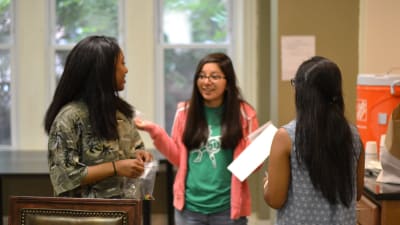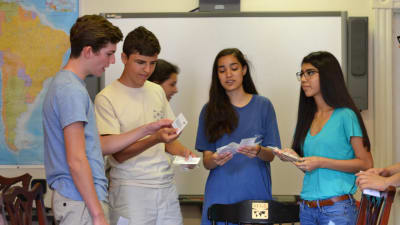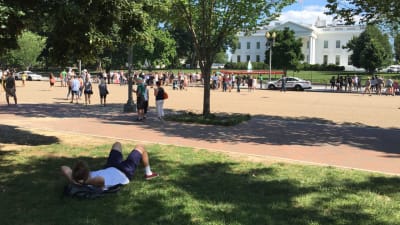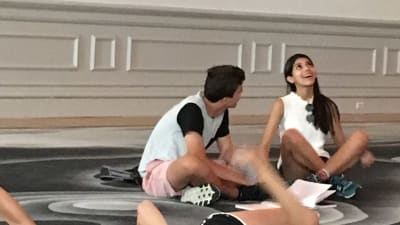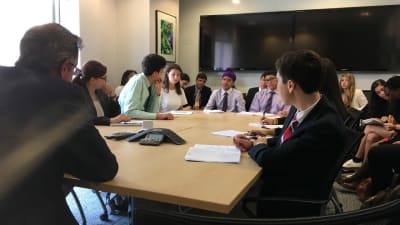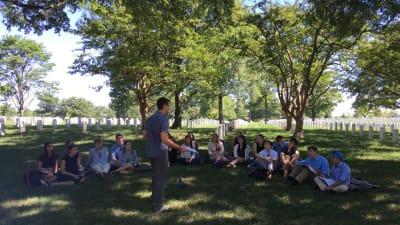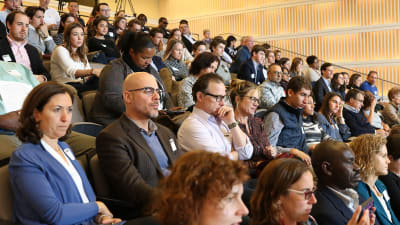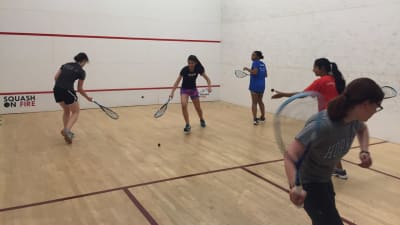Summer 2016: Week One!
Our first week is in the books and it was jam-packed! Already we have launched our first two case studies, taken time out to see a blockbuster art exhibit, and learned a new sport.
The Infamous Skittles Scenario, which begins our “Introduction to Ethical Decision Making” case study, is an early SEGL rite-of-passage. A hands-on state-of-nature simulation that has students scurrying after plastic bags of candy and cackling with delight or dismay at 3×5 “Chance” cards, the simulation is an engaging introduction to ethical decision making. (What would you do, after all, if there were no rules and limited resources? Would you use that gun you found? Help out a suddenly-blind friend? Lie? Join a makeshift band of mauraders?) The conversation that followed was fun and pensive.
We then gave the students an introduction to classic Western ethical theory–Aristotle, Kant, and John Stuart Mill–a 15 minute lecture that stretched into lunch because of all the good questions that students interjected. Later that day, we discussed “The Singer Solution to World Poverty,” by Peter Singer, and “Lifeboat Ethics: the Case Against Helping the Poor,” by Garrett Hardin. These articles are among the most important and controversial that the students will read this summer, and the conversation was so intellectually heated that our two hour session was over before we knew it.
Later in the week, we paid two visits that helped link ethical theory and ethical practice. The first of these visits was to USAID (United States Agency for International Development), the country’s lead agency for providing development assistance around the world. There we met with Tom Crehan, who leads the health and education team at USAID’s Middle East bureau, and Nancy Pressa, a Task Lead at USAID’s Office of Transition Initiatives, which helps assist governments in transition. Both had extensive experience: for example, Crehan was in Egypt during the Arab Spring and Pressa was in Haiti just after the 2010 earthquake. And both helped our students wrestle with the same ethical dilemmas they face: for example, can USAID truly provide what is needed when its mission also includes promoting American interests? Is it OK for the U.S. to refuse aid for foreign wheat production that would compete with U.S. grain exports? Crehan’s stories were a highlight, as was the simulated “Go/No Go” meeting that Pressa set up for the students.
On the Saturday before July 4th, we visited Arlington National Cemetery to speak with former SEGL faculty member and current U.S. Army Special Forces Captain [name removed for security reasons]. Against the backdrop of white grave stones on a perfect summer day, he walked the students through a heart-wrenching real-life “escalation of force” scenario at an Afghanistan checkpoint: how would you react to a child who is holding a cell phone, crying, not responding to your visual and verbal signals, and coming dangerously close? Along the way, he shared some of the legal/ethical guidelines he and others must follow before shooting someone. The ensuing conversation included several intense questions about military ethics (our guest has assisted with drone strikes, for example) and a mock debate between an American general and his allied Afghan counterpart over the upsetting practice of bacha bazi. The students then spent time visiting other parts of the Cemetery before departing for a reflective and rejuvenating afternoon.
On Wednesday night, we began our second case study by showing the students Ghosts of Rwanda. Ghosts, a PBS Frontline documentary from 2004, documents the 1994 Rwandan genocide and the world’s response (or lack of a response), and examines many of the ethical choices made during the conflict. The discussion that followed was thoughtful, occasionally tearful, and forward-looking, and continued long after the official end of the conversation.
Three of the leaders featured in the documentary are longtime SEGL guest speakers, and we met with the first of them on Thursday. Carl Wilkens is a former Adventist missionary who was the head of his church’s relief mission in Rwanda during the genocide. He was the only American to stay behind in 1994, and is most well-known for (among other acts) saving an entire orphanage from Interahamwe machetes. To SEGL graduates, he is a winner of our coveted “Golden Mug” award, which our graduates give to the speaker who has made the biggest difference in their lives. (Carl is also an honorary SEGL teacher; twice he has co-led a group of our students to Rwanda. To learn more about our last trip–we will almost certainly return–visit our SEGL in Rwanda page!)
Wilkens videoconferenced with the students from his RV, the home base of World Outside My Shoes, his genocide prevention NGO. The students asked him a wide range of questions–some personal, some political–and listened intently as he carefully and thoroughly addressed each one. Later, we will visit with George Moose (former Assistant Secretary of State for African Affairs), the Rwandan Embassy, and the U.S. Holocaust Memorial Museum to round out our study.
Two other highlights: First, on Wednesday afternoon we visited the blockbuster “Wonder” exhibit at the Smithsonian Renwick Gallery, just across the street from the White House. Art–particularly modern art–is notoriously hard on adolescents, but with a little help from Harvard’s Project Zero curriculum (and the engaging works themselves!) 90 minutes flew by. Afterwards, the students journaled their reflections in Lafayette Square, with the White House, the warm sun, and a small band of bag pipers providing a sensory backdrop.
Second, on Friday we put on our tennis shoes and visited Squash on Fire, a new enterprise launched by SEGL trustee Philippe Lanier (a real estate developer by trade). The organization’s goal is to expand the sport into new audiences, and our group definitely was a new audience! Nevertheless, after one lesson from two squash pros, the students decided to visit Squash on Fire three times a week!
Next up: a rainy but fun 4th of July, our third case study gets underway, and we add a mini-case study on the 2nd Amendment.
